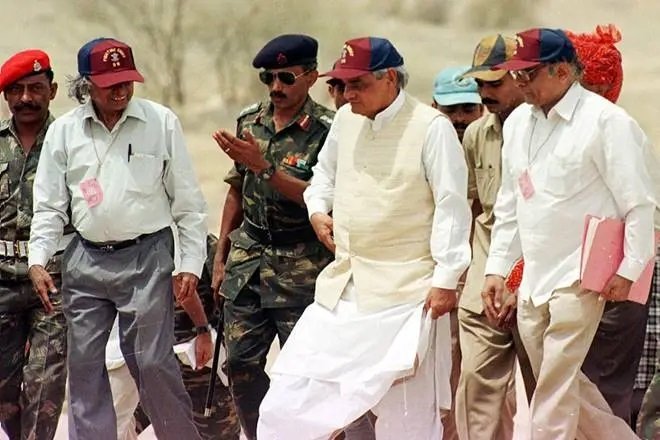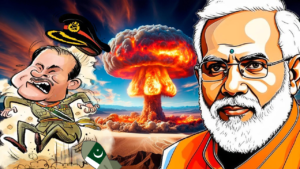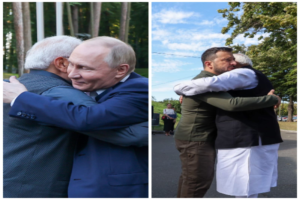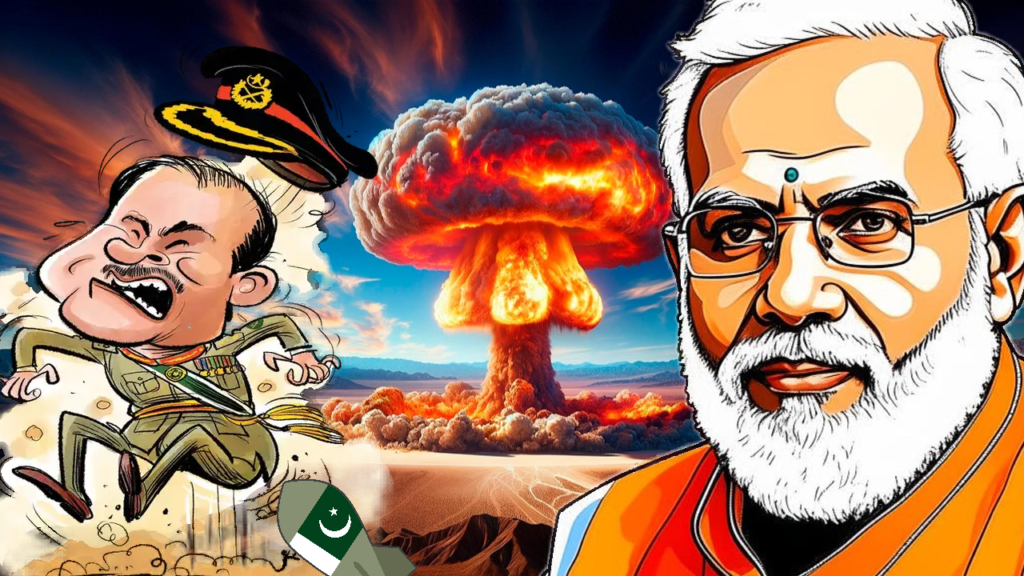“Today at 15:45 hrs India conducted three underground nuclear tests in the Pokhran range.” These were the words of our former Prime Minister, Late Shri Atal Bihari Vajpayee, when he declared India a nuclear weapon state in May 1998. But the story was not that easy going, India’s aspiration to go nuclear dated back to the 1970s when, in 1974, India conducted a ‘peaceful nuclear explosion’ under operation ‘Smiling Buddha’, as India had already made it clear these tests were not meant for nuclear weapons development and India being non-signatory to Non-Proliferation Treaty (NPT) India was not added to the list of nuclear weapons states.
Pakistan also conducted nuclear tests in May 1998, just a fortnight later. Was Pakistan already working on its nuclear weapons program, or did some other country hand a nuclear bomb to Pakistan to diffuse it immediately after India’s tests? Pakistan was humiliated by the defeat in the war against India in 1971, which concluded in the formation of a new country, Bangladesh. Pakistan was no match to India’s conventional warfare strategies, to offset India’s superiority in conventional warfare and to maintain the balance of power, Pakistan started developing its nuclear weapon program.
Pakistan’s nuclear weapons program also dates to the 1970s when A Q Khan, Pakistan’s father of the atomic weapons program, copied confidential centrifuge designs and supplier contacts during his work at URENCO, a Dutch firm specialising in Uranium enrichment through gas centrifuges. In 1976, AQ Khan, with the support of the state, founded Kahuta Research Laboratories, focusing on Uranium enrichment using stolen centrifuge designs. It is believed that Pakistan had a workable nuclear device by 1987-88, but conducted a test only after India detonated a nuclear bomb in the Pokhran range in May 1998.

Can the World Trust Pakistan with Nuclear Weapons?
NO, Pakistan’s continual rhetoric of attacking India with a nuclear bomb regularly, its fragile economy, political instability, separatist movements, military dominance over civilian government, open support to terrorists and their organisations and recent nuclear radiation leak reports during operation Sindhoor demonstrate Pakistan’s ineptness in handling its atomic weapons and pose a threat to World peace.
Pakistan’s establishment (military) is aware of its incompetence and inferiority to India in terms of conventional warfare, as was discernible during the operation Sindhoor launched by India in retaliation for the barbaric terrorist attack in Pahalgam, Kashmir in April 2025, which claimed the lives of 26 innocent civilians. Therefore, Pakistan resorts to nuclear bluff whenever it is incapable of handling India’s response to its terrorism.
Pakistan’s fragile economy is surviving on IMF bailout packages and some pennies in its begging bowl, which it carries everywhere it goes. Rough estimates suggest that Pakistan requires $2 billion to maintain its nuclear arsenal. Even after spending this much amount, Pakistan is incapable of protecting its nuclear weapons, as reported in a radiation leak during Operation Sindhoor, when India strikes Kirana Hills, where Pakistan stores its nukes.
The political unrest, separatist movements, and ongoing support for terrorism in Pakistan pose a risk of nuclear weapons falling into the hands of non-state actors. Should this occur, it would introduce chaos and uncertainty in the region and beyond. Although non-state actors might lack the necessary expertise and technological backing to initiate nuclear strikes, they can certainly engage in the trade of these weapons. This scenario could lead to nuclear proliferation worldwide. Imagine if Iran were to acquire these nuclear arms via its proxies or other terrorist factions; this would drastically alter the balance of power in favour of Iran against countries like Israel and Saudi Arabia. Even if Israel gets a slight hint of this happening, it will attack Iran and its proxies in the region, leading to full-scale regional war. Saudi Arabia might start its nuclear weapons program to offset the nuclear advantage of Iran, leading to a nuclear race in the Middle East.
Pakistan’s record regarding nuclear proliferation is alarming. The father of Pakistan’s atomic weapon program, AQ Khan, confessed on a live TV show in 2004 that he ran a network facilitating nuclear proliferation to countries such as Iran, North Korea, and Libya. In 2003, the US and International Atomic Energy Agency (IAEA) investigation into Libya’s Weapons of Mass Destruction (WMD) program uncovered its links to AQ Khan. Two years later, in 2006, North Korea became a nuclear weapons state, and Iran still aspires to become one, having enriched uranium to 60%. The path to 90% enrichment is relatively straightforward; do not be surprised if Iran conducts nuclear tests in the next five years.
Can Pakistan’s nuclear threat to the world be mitigated in any way?
The de-nuclearizing of Pakistan is the only option to mitigate the nuclear risk emanating from the country. A rogue nation like Pakistan has no future and therefore it has nothing to lose. In contrast, India, which has the potential to become the next superpower, has much more to lose in the event of a full-scale war or continued terrorism originating from Pakistan. Pakistan acts as an obstacle to India’s development and thus justifies its disintegration. However, before that, it needs to be de-nuclearized.
South Africa is the only country to have built nuclear weapons and then voluntarily dismantled them. However, there is a fundamental difference between Pakistan and South Africa: Pakistan is not ruled by its elected government, but by its military establishment. As is often said, Pakistan does not have an army, the army has Pakistan.
We cannot expect Pakistan to voluntarily dismantle its nuclear arsenal, as South Africa did in the early 1990s. The only way to de-nuclearize Pakistan is through a ‘snatch and grab’ operation.
The United States was quick to assess the nuclear risk emanating from Pakistan. According to NBC News, the U.S. has a contingency plan to seize Pakistan’s nuclear weapons in case of internal chaos, hostilities with India, a serious terrorist threat to nuclear facilities, or Islamic extremists taking control of the government or military. All of these scenarios are highly plausible in Pakistan, and having such a contingency plan is commendable. However, the U.S. cannot ignore India in its Pakistan strategy, as India is extensively engaged with the U.S. in military, intelligence, and other domains, and could provide vital logistical support for moving nuclear weapons out of Pakistan.
India needs to foster conditions in Pakistan that would compel the U.S. to activate its contingency plans. Internal chaos is one of the many scenarios under which the U.S. might intervene to secure Pakistan’s nuclear arsenal. India must support the Balochistan Liberation Army and the aspirations of Sindhudesh, as doing so would contribute to instability within Pakistan.
Last year, the U.S. was alarmed by new developments in Pakistan. The nuclear-armed country was advancing its long-range ballistic missile capabilities, which could eventually allow it to strike targets far beyond South Asia, posing an emerging threat to the United States. In response, the U.S. imposed sanctions on four Pakistani entities involved in ballistic missile development and banned American businesses from engaging with them.
In its latest 2025 Worldwide Threat Assessment, the U.S. Defence Intelligence Agency stated: “Pakistan regards India as an existential threat and will continue to pursue its military modernisation effort, including the development of battlefield nuclear weapons, to offset India’s conventional military advantage. Pakistan is modernising its nuclear arsenal and maintaining the security of its nuclear materials and nuclear command and control. Pakistan almost certainly procures WMD-applicable goods from foreign suppliers and intermediaries.”
An incompetent country like Pakistan, which cannot even ensure the safety of its existing nuclear arsenal, is now modernising it, which poses a significant threat to global peace, as discussed in the blog.
Must Read

DE-NUCLEARIZING PAKISTAN: A STRATEGIC NECESSITY FOR GLOBAL SECURITY


